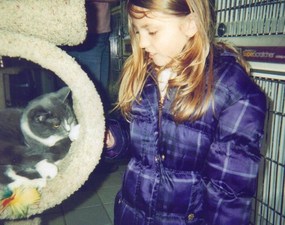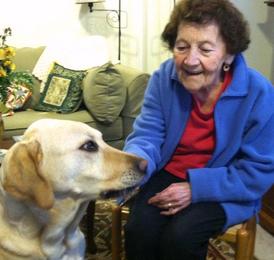Take Action: What You Can Do Now
“How wonderful that no one need wait a single moment to improve the world.”
Anne Frank
“How wonderful that no one need wait a single moment to improve the world.”
Anne Frank
CARE FOR ANIMALS AND PEOPLE

Take your kids to an animal shelter to adopt their new best friend or to volunteer. It's never too soon to teach children that animals are thinking, feeling beings, not toys or inventory--and to plant the seed of altruism. Instead of birthday gifts, 9-year-old Jenny, left, asked her friends to give toys and supplies to the dogs and cats of Friends of the Plymouth Pound.
Read books about animals to children at the library, talk to a classroom or scout troop, and lead after-school activities that nurture empathy, respect and advocacy for animals. Children witness violence and abuse daily--in their own lives or on TV, in movies and on the Internet. Offset these negative messages by instilling compassion for all living beings. It's good for animals, for people, for society. And for you.
Offer to be a “pet pal” for your local hospice: You can make an enormous difference in two lives by helping care for a patient’s pet so they won’t be separated when an animal's love is most needed. Then find a new home for the animal at the appropriate time. Contact Coalition to Protect and Rescue Pets for an adoption application form (you must always screen prospective adopters!) and advice on creating effective flyers if you're not working with a shelter.
Read books about animals to children at the library, talk to a classroom or scout troop, and lead after-school activities that nurture empathy, respect and advocacy for animals. Children witness violence and abuse daily--in their own lives or on TV, in movies and on the Internet. Offset these negative messages by instilling compassion for all living beings. It's good for animals, for people, for society. And for you.
Offer to be a “pet pal” for your local hospice: You can make an enormous difference in two lives by helping care for a patient’s pet so they won’t be separated when an animal's love is most needed. Then find a new home for the animal at the appropriate time. Contact Coalition to Protect and Rescue Pets for an adoption application form (you must always screen prospective adopters!) and advice on creating effective flyers if you're not working with a shelter.

Bring your sociable, calm pet to a nursing home, assisted living facility or a shelter for those who are homeless or victims of domestic abuse. There is no medicine as powerful as an animal's unconditional acceptance and love. Studies have shown the physical benefits of simply petting an animal! You can do this on your own (get clearance from the facility manager first) or with a pet-facilitated therapy organization in your community.
Keep animals out of shelters by helping an individual in your community who is elderly, disabled or suffers a debilitating illness care for his or her pet. Walk the dog, play with the cat. Stop by the store to pick up food and supplies for the pet and person, and transport animals to the vet. For a nice birthday or anytime gift, why not provide assistive pet-care tools that make it easier for someone with physical limitations to care for their cat or dog. Who to help? You might have a neighbor who needs a hand. Or ask your city’s Senior Services coordinator to connect you with someone who does. Your assistance is an act of kindness for the animal and the person who loves him or her.
Offer a temporary haven to a homeless animal. If you do this through an animal shelter or rescue group, the organization will pay for veterinary care, food and supplies. As a foster caregiver, you provide the TLC that can keep an animal connected to humans--and adoptable.
Open your heart and home to a senior pet. You can do this as an adopter or what some shelters and rescue groups call a "forever foster," meaning they'll provide assistance with veterinary care for the life of the animal. Many senior dogs and cats languish for years in shelter cages while they watch puppies and kittens scamper off to new homes. Yet older animals are calmer and often more affectionate than the young ones most people want. Knowing you have given a cast-off dog or cat the chance to spend his of her golden years in peace, comfort and love is tremendously rewarding.
Keep animals out of shelters by helping an individual in your community who is elderly, disabled or suffers a debilitating illness care for his or her pet. Walk the dog, play with the cat. Stop by the store to pick up food and supplies for the pet and person, and transport animals to the vet. For a nice birthday or anytime gift, why not provide assistive pet-care tools that make it easier for someone with physical limitations to care for their cat or dog. Who to help? You might have a neighbor who needs a hand. Or ask your city’s Senior Services coordinator to connect you with someone who does. Your assistance is an act of kindness for the animal and the person who loves him or her.
Offer a temporary haven to a homeless animal. If you do this through an animal shelter or rescue group, the organization will pay for veterinary care, food and supplies. As a foster caregiver, you provide the TLC that can keep an animal connected to humans--and adoptable.
Open your heart and home to a senior pet. You can do this as an adopter or what some shelters and rescue groups call a "forever foster," meaning they'll provide assistance with veterinary care for the life of the animal. Many senior dogs and cats languish for years in shelter cages while they watch puppies and kittens scamper off to new homes. Yet older animals are calmer and often more affectionate than the young ones most people want. Knowing you have given a cast-off dog or cat the chance to spend his of her golden years in peace, comfort and love is tremendously rewarding.

Set an example of compassion by feeding wildlife. Your--or your neighbors'--kids can help. Along with the fun of watching bunnies, birds and squirrels scamper and play, children will learn the joy and responsibility of caring for others, including those who can't give back.
BE AN EFFECTIVE ADVOCATE FOR ANIMALS

Call and/or visit your municipal, state and US lawmakers. Let them know your concerns for animals in general, or express your support for (or opposition to) specific legislation where you live and at the federal level. ALWAYS read legislation, not just an advocacy group's summary, before you lobby for or against it; if you don't understand it, ask your lawmaker's staff for help. Online petitions do NOT influence lawmakers, but your personal contact as a constituent sure does! Don't know who your elected officials are? Ask your local League of Women Voters or city/town hall. Or click here.
Build an advocacy network of friends, family members, co-workers, people you meet in doggy park--everyone who shares your belief that animals deserve to be protected from neglect and abuse. That includes painful, risky cosmetic and behavior-masking surgeries, like devocalization, declawing, ear cropping and tail docking, that animals didn't ask for, don't need and are helpless to refuse. Mobilize your network via email, Facebook, Twitter or old-fashioned phone calls when an animal concern or legislation arises that needs support.
Educate the public--and your vet--about the cruel reality of devocalization and declawing, which expose animals to pain and suffering without any benefit, not even a secure home. Take a minute to talk to your vet about your concern that animals not be subjected to these behavior-masking surgeries. You're the client; you have the right. While the public may not know the life-threatening risks of devocalization, or that declawing is actually an amputation, your vet does. However, he or she may not realize that declawed and devocalized animals are abandoned and relinquished to shelters like any other dog or cat. In fact, behavior problems that stem from declawing and the huge expense of life-saving surgery for complications of devocalization may increase the risk of homelessness following these elective procedures.
Make sure the news media and bloggers get it right. Call the news director when there's a story on TV or radio that promotes events in which animals are exploited or treated cruelly, such as the Iditarod. Politely register your concern. Don't forget to commend the media for what they do right, like the ABC News expose on Westminster or the NBC News report on devocalization. Ditto newspapers and magazines; contact the editor-in-chief. If the offender is an online news source or blog, don't add a comment to a story that makes short shrift of animal cruelty; every post, positive or negative, increases the blog's value. The last thing you want to do is reward a blogger for bad behavior!
Copyright © 2015 Coalition to Protect and Rescue Pets. All Rights Reserved.

